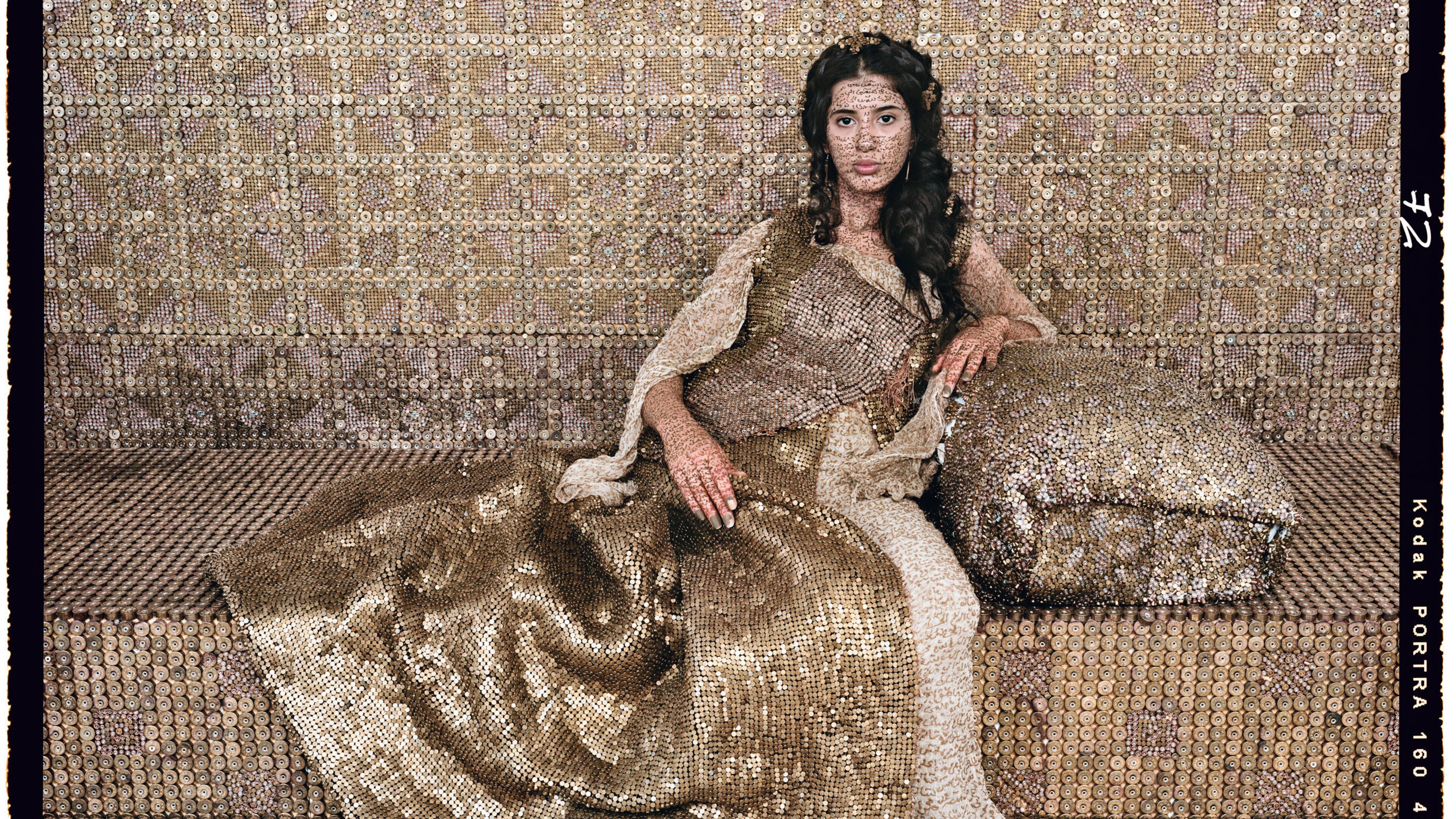Essaydi expresses uneasiness with modern Morocco with bullets, bottle caps

“Conflicted Identities,” the latest exhibit by Moroccan-born Lalla Essaydi through June 29 at Jackson Fine Art, is a complex and provocative work that reflects on the artist’s uneasiness in reconciling her multicultural identity in the context of Islamic culture.
The exhibit of six large-scale, color photographic prints combines two ongoing series that, taken together, span more than two decades of work: “Bullets Revisited,” a continuation of her previous series, “Bullets,” which denounced the violence women were subjected to following the repression of the Arab Spring — and “Conflicted Identities,” her latest series for which Essaydi uses beer bottle caps as a metaphor to expose the rise of alcohol consumption in Morocco.

As a self-proclaimed feminist, Essaydi has always been interested in conjuring the rights of women and condemning their limitations in Islamic culture. But since her “Bullets series,” she has manifested an engagement with contemporary political realities that were less salient in previous work. “My work has become heavier, more intense in the process as well. It is almost like there is a crescendo where all these things are getting together.”
Every aspect of Essaydi’s art is metaphorically loaded, from the confined space in which she has framed her models to the monumental dresses she has created for them. She resists stereotypes and embraces a polyphony of representations. “In my work, I wish to present myself through multiple lenses — as an artist, as Moroccan, as traditionalist, as liberal, as Muslim,” she says. This complexity is what makes her work rich and absorbing.
Born in Marrakech, in 1956 to a traditional Muslim family, Essaydi grew up in a postcolonial country struggling to find its own identity. She left Morocco at age 16 to attend high school in France and lived in Saudi Arabia before moving to the United States. She felt the urge to go back after the COVID pandemic, during which she had been locked down in Boston and separated from her family. It made her rethink her ties to her home country and her desire to go back.
Her years away from Morocco informed her sensibilities and shifted her gaze on the country she left. She started noticing behaviors in her home country she wasn’t accustomed to, such as alcohol consumption. “Morocco is a Muslim country, yet we manufacture and export alcohol, both wine and hard liquor. Inebriation is common in Morocco, a country that prides itself on its Islamic beliefs and traditions. This pretending manifests itself in strange ways.”
In “Bullets Revisited,” she positioned her subjects in front of monochromatic tapestries composed of thousands of bullet casings sewn together. Her models almost disappeared into their backgrounds, wearing metallic dresses made of bullet shells. In her ongoing series, “Conflicted Identities,” she replaced the bullets with used beer caps that she collects wherever she travels.

The dresses become the symbol of the conflicted society she is now part of, torn between “an idealized past and an undecided future.” One of them on display at the gallery reveals the intricate work of weaving thousands of colorful caps into the fabric of the dress.
The process requires painfully long hours of labor and months of preparation. As excruciating as it is, it remains a process that she deems necessary to become intimate with her work as well as with the dozens of women who help her build her the dresses and backdrops.
It is during this time of exchange with other women, young and elderly, that she collects notes and reflections that she will later inscribe on the surface of her models’ bodies. Inspired by 19th-century Orientalist imagery, she uses calligraphy, a sacred Islamic art that is historically inaccessible to women — but she applies this writing with henna, an adornment traditionally reserved for women. Through this subversive act, she reclaims a female agency, the henna/calligraphy combination becoming both a veil and an expressive statement.
Essaydi knows intimately that the gaze she is projecting and her way to go beyond the stereotypes would not have been possible without estrangement from her homeland. It is precisely this conflicted state, as uncomfortable as it might have been, that has allowed her to take a critical distance from modern Morocco and to convey her rich and sensitive experience as an Arab woman.

PHOTOGRAPHY PREVIEW
Lalla Essaydi: “Conflicted Identities”
Through June 29 at Jackson Fine Art. 10 a.m.-5 p.m. Tuesdays-Saturdays. 3122 E. Shadowlawn Ave. N.E., Atlanta. 404-233-3739, www.jacksonfineart.com

MEET OUR PARTNER
ArtsATL (artsatl.org) is a nonprofit organization that plays a critical role in educating and informing audiences about metro Atlanta’s arts and culture. ArtsATL, founded in 2009, helps build a sustainable arts community contributing to the economic and cultural health of the city.
If you have any questions about this partnership or others, please contact Senior Manager of Partnerships Nicole Williams at nicole.williams@ajc.com.


